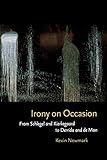Irony on Occasion : From Schlegel and Kierkegaard to Derrida and de Man / Kevin Newmark.
Material type: TextPublisher: New York, NY : Fordham University Press, [2022]Copyright date: ©2012Description: 1 online resource (380 p.)Content type:
TextPublisher: New York, NY : Fordham University Press, [2022]Copyright date: ©2012Description: 1 online resource (380 p.)Content type: - 9780823240135
- 9780823291878
- online - DeGruyter
| Item type | Current library | Call number | URL | Status | Notes | Barcode | |
|---|---|---|---|---|---|---|---|
 eBook
eBook
|
Biblioteca "Angelicum" Pont. Univ. S.Tommaso d'Aquino Nuvola online | online - DeGruyter (Browse shelf(Opens below)) | Online access | Not for loan (Accesso limitato) | Accesso per gli utenti autorizzati / Access for authorized users | (dgr)9780823291878 |
Browsing Biblioteca "Angelicum" Pont. Univ. S.Tommaso d'Aquino shelves, Shelving location: Nuvola online Close shelf browser (Hides shelf browser)

|

|

|

|

|

|

|
||
| online - DeGruyter Intimacy and Italian Migration : Gender and Domestic Lives in a Mobile World / | online - DeGruyter Into Disaster : Chronicles of Intellectual Life, 1941 / | online - DeGruyter Intrigues : From Being to the Other / | online - DeGruyter Irony on Occasion : From Schlegel and Kierkegaard to Derrida and de Man / | online - DeGruyter Is There a Sabbath for Thought? : Between Religion and Philosophy / | online - DeGruyter Isaac On Jewish and Christian Altars : Polemic and Exegesis in Rashi and the Glossa Ordinaria / | online - DeGruyter Italian Folk : Vernacular Culture in Italian-American Lives / |
Frontmatter -- Contents -- Acknowledgments -- Gibs auf! -- Give it up! -- Introduction: Irony on Occasion -- Part one. Romantic Irony -- One. Friedrich Schlegel and the Myth of Irony -- Two. Taking Kierkegaard Apart: The Concept of Irony -- Three. Modernity Interrupted: Kierkegaard’s Antigone -- Four. Reading Kierkegaard: To Keep Intact the Secret -- Five. Fear and Trembling: “Who Is Able to Understand Abraham?” -- Part two. Postromantic Irony -- Six. Signs of the Times: Nietzsche, Deconstruction, and the Truth of History -- Seven. Death in Venice: Irony, Detachment, and the Aesthetic State -- Eight. Terrible Flowers: Jean Paulhan and the Irony of Rhetoric -- Part three. The Irony of Tomorrow -- Nine. On Parole: Legacies of Saussure, Blanchot, and Paulhan -- Ten. “What Is Happening Today in Deconstruction” -- Eleven. Bewildering: Paul de Man, Poetry, Politics -- Coda: Dark Freedom in J. M. Coetzee’s Disgrace -- Notes -- Index
restricted access online access with authorization star
http://purl.org/coar/access_right/c_16ec
What is it about irony—as an object of serious philosophical reflection and a literary technique of considerable elasticity—that makes it an occasion for endless critical debate? This book responds to this question by focusing on several key moments in German Romanticism and its afterlife in twentieth-century French thought and writing. It includes chapters on Friedrich Schlegel, Søren Kierkegaard, Friedrich Nietzsche, Thomas Mann, Jean Paulhan, Maurice Blanchot, Jacques Derrida, and Paul de Man. A coda traces the way unresolved tensions inherited from Romanticism resurface in a novelist like J. M. Coetzee. But this book is neither a historical nor a thematic study of irony. To the degree that irony initiates a deflection of meaning, it also entails a divergence from historical and thematic models of understanding. The book therefore aims to respect irony's digressive force by allowing it to emerge from questions that sometimes have little or nothing to do with the ostensible topic of irony. For if irony is the possibility that whatever is being said does not coincide fully with whatever is being meant, then there is no guarantee that the most legitimate approach to the problem would proceed directly to those places where "irony" is named, described, or presumed to reside. Rather than providing a history of irony, then, this book examines particular occasions of ironic disruption. It thus offers an alternative model for conceiving of historical occurrences and their potential for acquiring meaning.
Mode of access: Internet via World Wide Web.
In English.
Description based on online resource; title from PDF title page (publisher's Web site, viewed 03. Jan 2023)


